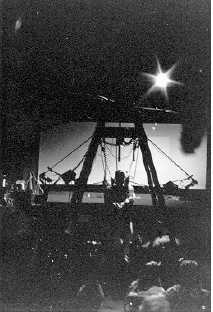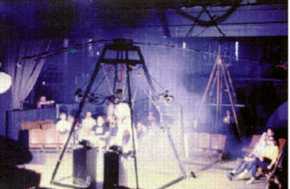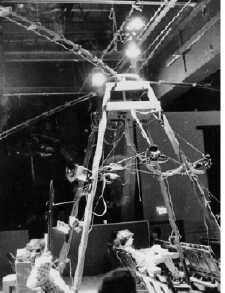| |
The Helicopter Project / The
Extinction of the Ammonites
r.cheat/m
So where does that leave a contraption? Not entirely original
— but not devoid of a certain cleverness. A contraption gathers
proprieties but then disperses them under a different sign, that
of cleverness and contrivance, a confabulation and conjoining
of disparities to achieve a unified effect —- and a contraption
is all effect (even if a genuine invention does underlie its workings),
all joints visible and contributing to its effectiveness. An effectiveness
based less on its utilitarian working-ness than on its conveyance
of a certain appearance of working-ness.
The word contraption is an amalgam of 'contrivance' and 'deception'
(according to Webster's). It is thus a volatile re-working of
events or most particularly things whose assembly is not guided
by some sort of rectitude, verisimilitude or representative efficacy
but rather by a willful and deceptive collation of things in parataxis.
We can suppose, then, that a contraption is (1) a physical assemblage
which is (2) not guided by 'true' inspiration, genius, or originality
(i.e., it may possess all those attributes, however, they are
not 'true', but misleading, often intentionally) and which is
(3) somehow at odds with the reality which it purports to represent.
Perhaps it is that a contraption is thought to represent only
the cleverness and the contrivance that went into its assembly
but not the 'deeper', 'truer' events of which it could be said
ture genius, inspiration and invention would provide. If invention
is a dislocator of values, a contraption would be a confusion
of values; or perhaps better yet, a bricolage of values which
would be a suspension of closure by mastery or 'coming to a head'
(that is, can never be truly productive in the sense that true
invention would be) because it is the product itself, is the result
of the machineries of productivity (it thus represents re-productivity)
and does not give rise to an originary productivity or fruitfulness;
it is always a worn and patched hand-me-down. It is barren and
threadbare but wishes us to think otherwise. "Invention begins
by being susceptible to repetition, exploitation, reinscription."
(Derrida, Psyche...) The contraption is the end
result (and the beginning), being nothing but repetition, exploitation
and reinscription; the ghost has left the machine. And yet...
There is work, of a sort, that still goes on: not in the contraption
but around and about it. It still generates activity but it is
the type of work that polynesian cargo cults celebrated. It is
a machine with a vacuum at its core, an eviscerated machine but
one which still walks and proffers an all-too-apparent 'present-ness'.
The invention's fate is always to generate a double. Every invention/machine
is accompanied by a contraption almost as every human is said
to be accompanied by a geist or spirit. With this major exception:
the terms of embedding are reversed. The contraption, techne's
soul-equivalent, amounts to a mere assemblage of visual elements,
its distribution along a heterogeneous network but arranged to
homogeneous ends, Its fetishistic quality is apparent (or should
we say re-presentative?) but the whole to which it refers —
the invention\machine — is simply another collection of parts.
The invention/machine, in other words, is clothed (or surfaced)
with its soul in contrast to human physicality which is said to
be inhabited by the soul.
* * *
"(Invention) institutes a repetition or an imaginary reflexivity
that, even as it divides the inaugural Act, at once the inventive
event and the relation or archive of an in-vention, also allows
it to unfold in order to say nothingbut the same, itself, the
dehiscent and refolded invention of the same, at the very instant
it takes place."
Jacques Derrida
* * *
The point of torsion is not easily found. (The point of torsion
being that moment when translation commences: the movement from
one realm to another.) It is always too early to determine the
nature/depth of those realms: ontological or 'merely' epistemological.
(Always too early — or maybe too late; at any rate the time
is never just right — because we can never get behind that
moment of translation.) The torsion never snaps loose after the
realms are joined, seemingly merged; the twisting of language
in its description, its meeting of its other is simply subsumed
into this region.
The contraption thus becomes a kind of translation device, a mediator
(one not without its own ontological pitfalls) between formerly
incom-mensurable realms. However, the contraption also embodies
the twisting characteristic of translation, an off-axis displacement,
which is itself the result of torsional displacement. (It is a
twist based on a twist, etc.) What is the contraption translating
from and to? Ostensibly from pure 'machine-ness' to pure 'human-ness',
the contraption being an admixture of effects jerked from both
realms (in this the contraption joins with the concepts of the
monstrous and the grotesque), thrown and twisted together such
that the identities of each become confused. (Of course, in a
very real sense there are only contraptions, in the sense that
there are no pure, untangled identities or meanings that can be
gotten at for either the machine or the human.)
According to the Oxford English Dictionary another formative meaning
may come from the word 'trap'. A contraption certainly seems to
trap meanings, its semiotic surfaces particularly sticky along
certain vectors, determinable for each human/contraption/machine
vector (by an analytic which actually owes more to the contraption
at least in any performative sense).
In quite another sense, as indicated by the term pit-fall, a heterogeneous
assemblage, as an example of all double-hinged structures, has
an element of indeterminate-ness which functions as loss (for
the identitiy of the human component) and gain (in the form of
complexity which might perhaps lead to identity) for the machine.
It is not clear that this second trap component is weighted solely
in favor of the machine, although the modern era would lead one
to such a conclusion. It is clear that that somewhat entropic
modifications of human identity occur at the interface/representation
of the contraption such that modifications of the terms 'human
identity and nature' are necessary.
Jacques Derrida describes two types of invention: (1) unveiling
discovery and (2) productive discovery, thus: "(1) 'first
time', the event of a discovery, the invention of what was already
there and came into view as an existence or as meaning and truth;
(2) the productive invention of a technical apparatus that was
not already there as such."
It is not exactly the case that the first sort of discovery/invention
is a propaedeutic for the second, but it is also not apparent
the extent and manner in which they are linked. Certainly, as
Derrida points out, the idea of invention is nowadays linked almost
exclusively to a certain logico-mathematical apparatus, one which
increasingly has little need of the idea of an 'unveiling' of
a certain sort of truth, discovery or invention.
However, for the moment, let us consider the possibility of precursor
effects, operating in the first sphere of invention which herald
the arrival of the apparatus or contraption (unlike actual cargo
cults which are about prompting the re-appearance of a now-disappeared
artifact. Can the 'event' precede the 'apparatus'? Tom what extent
can history and consciousness be parsed into event and apparatus?
In the modern world there would seem to be mainly the sequence:
apparatus——-> event, logico-mathematical structures
in programmed development giving rise to circumstances to which
we must adapt. Even in an overt sense, event giving rise to apparatus
appears not to have much currency, the sense of control and intentionality
being at odds with a larger movement (the movement of apparatus
to event).
Where would this primal event, which would precede its embodiment
in a physical (logico-mathematical) contraption, come from? Not
from the more circumscribed limits of human 'nature' as we now
understand it since that understanding includes a virtually dis-entanglible
imbrication of apparatus/event, precluding any sort of primal,
or originary phase which would be outside the sphere of operation
of tekhne'/psyche'.
And yet...Perhaps this loaded nexus (vectored in the direction
of tekhné), in its foreclosing of the event-horizon,
is not as omnipotent as its very formidable appearance would indicate.
Perhaps its formidableness comes less from a position of complete
power than from the ability to curtail and control a certain sort
of vision (or rather: the power to substitute visibility for vision).
Perhaps the modern is mainly the rise of the logico-mathematical
apparatus and associated reactions and a nostalgia (in the arts)
for invention #1, the 'unveiling' of truth rather than its programmed
discovery. Where do we find the idea of the pure event? The ability
to think the event is not the event but rather the programming
of the event and impinges on invention #2, the logico-mathematical.
"How does it happen that we no longer speak of the invention
of the Cross or the invention of truth (in a certain sense of
the truth) while we speak, if not exclusively, of the inventor
of printing, of steam-powered shipping, of a logico-mathematical
apparatus, that is , of another form of relation to truth? You
see that, despite this shift in orientation, it is still in both
cases the truth that is at issue. A fold or a juncture separates
while joining these two senses of the meaning, which are also
two forces or two tendencies, relating to each other, the one
settling over the other, in their very difference. We may have
in these texts a momentary bridging, a furtive and unsure instance
of 'invention' still meaning the invention of truth in the sense
of a discovery unveiling what is already there, while also meaning
already the invention of another type of truth and another sense
of the word 'truth': that of a judicial proposition, thus of a
logico-linguistic mechanism. Then the concern is with production,
that of the most appropriate tekhne, with the construction of
a machinery that was not previously there, even if this new mechanism
of truth must in principle still be modeled on the first type.
The two meanings remain very close, to the point of being confused
in the relatively common expression 'invention of the truth' yet
I believe they are heterogeneous. It seems to me that they have
never stopped accentuating what separates them, and that the tendency
of the second one, since its appearance, has been to assert its
undivided supremacy."
and:"The two extreme types of invented things, the mechanical
apparatus on the one hand, the fictional or poetic narrative on
the other, imply both a first time and everytime, the inaugural
event and iterability."
Jacques Derrida
The interesting thing is this: The anomalous event is always and
only a first time even when it is repeated (unlike pop culture
where there does not seem to have ever been a first time). And
not only that: the anomalous event conflates the mechanical and
the narrative, for example UFO sightings, so that it is not clear
which is predominant: a narrative 'method' or a mechanical 'substance'.
The event uses one extreme to invalidate the other, a collision
of contraries wherein both evaporate.
However, if there is any truth to the concept of the dialectic,
the contraries have not disappeared but have sublimed or sublated.
The only traces that a precursor event provide are in a 'forward'
direction. That is, they come to us as 'to be' not as 'was'. The
archaeological strata which they inhabit may only be excavated
in the future, although the faux 'presenting' of a precursor event
does provide a form of re-presentation.
* * *
To be addressed: the question of producibility, re-producibility,
re-production, in anything other than the biological sphere, belongs
to the province of tekhne, that regulated mainpulation of material
in recurrent, punctuated and self-same patterns (a primary event
may only be self-same with itself, Benjamin's loss of aura of
the manufactured object is really a saturation of aura, where
it no longer has any relevance, because of multiplication of apparent
self-sameness. Nothing has disappeared. It simply has more competition,
both from copies of itself and through other copies (or copies
of the Other, and for the most part the only Other that most people
encounter is through a copy - or a contraption) and of course
translation (mostly) takes place between copies or systems through
which copies find their existence and their production, rather
than from one primal event to another.
'To be addressed:' addresses assume locations within grids, capable
of stabilized, repeatable returns to nodes characterizing identitiy.
But suppose that our identity papers become lost or burned or
confiscated. False or anomalous address? Return to sender.
Still...'to be addressed:'
|
|


